

South Korea's opposition party chiefs on Monday expressed objections to the deployment of a U.S. missile shield in their homeland, calling for dialogue with the Democratic People's Republic of Korea (DPRK) in their rare meeting with President Park Geun-hye.
Park met with the leaders of three major political parties for about two hours in the presidential office to discuss how to address the DPRK's fifth nuclear test, according to Park's office.
The meeting was attended by ruling Saenuri Party chairman Lee Jung-hyun, main opposition Minjoo Party chairwoman Choo Mi-ae and interim head of the minor opposition People's Party Park Jie-won as well as top presidential security advisor Kim Kwan-jin and ministers of foreign affairs and unification.
Asked directly by Park about whether to favor the Terminal High Altitude Area Defense (THAAD) in South Korea, the People's Party chief expressed his clear objection to the THAAD deployment on the South Korean soil, he told reporters after the meeting with the president.
The Minjoo party chairwoman said the THAAD issue is not of military nature but of diplomatic one, telling the president that the U.S. missile defense system cannot protect South Korea from the DPRK's nuclear threats from a military perspective.
The chairwoman said close relations with China, South Korea's largest trading partner, can help save people's livelihood economically, according to local media reports.
Seoul and Washington agreed in July to install one THAAD battery in southeastern South Korea by the end of next year despite strong oppositions from China and Russia.
China and Russia have opposed the U.S. missile shield, of which X-band radar can peer deep into their territories, breaking strategic balance in the region and damage security interests of the two countries.
President Park and the three party leaders denounced the DPRK's fifth nuclear test with one voice, but they were divided over how to deal with the DPRK's nuclear and missile program.
Pyongyang said Friday that it successfully conducted an explosion test of nuclear warhead that can be mounted on ballistic missiles. Seoul's military estimated it is the "most powerful" nuclear detonation so far with a yeild of 10 kilotons, stronger than 6 kilotons recorded in the previous test in January.
The two opposition party chiefs called on President Park to resume talks with the DPRK, though they acknowledged the need for sanctions against Pyongyang.
The main opposition party chairwoman asked Park to send a special envoy to Pyongyang as part of dialogue efforts, but the president flatly rejected the proposal, saying it will allow the DPRK, which focuses only on advancing a nuclear capability, to buy time.
In her introductory remarks, President Park denounced the DPRK's nuclear ambitions as "reckless and fanatic" adherence. "It clearly shows once again how reckless the North Korean (DPRK) regime is and how fanatically it adheres to a nuclear (program)," Park said.
She said Pyongyang's fifth nuclear test showed a totally different pattern from previous tests that had been carried out every three years or so.
The DPRK's first atomic device test was conducted in October 2006, followed by the second in May 2009 and the third in February 2013. The explosive yield has risen from 0.4 kilotons in the first test to 6 kilotons in the fourth and 10 kilotons in the fifth.
Park said South Korea is seeking to adopt stronger sanctions toward the DPRK rapidly in cooperation with the international community.
In March, UN Security Council introduced tougher-than-ever sanctions on Pyongyang over its fourth nuclear detonation in January and the launch in February of a long-range rocket. The DPRK is banned from any test of nuclear and ballistic missile technologies under UN Security Council resolutions.
Citing Pyongyang's claim that it successfully miniaturized nuclear warheads small enough to fit on ballistic missiles, Park said the DPRK's nuclear and missile programs are not a simple blackmail but an urgent, realistic threat targeting South Korea.
The DPRK has said it will continue to develop its nuclear capability despite increasing condemnation by the international community.
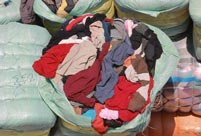 Shenzhen seizes 549 tons of illegally smuggled clothing
Shenzhen seizes 549 tons of illegally smuggled clothing Chinese actor Wang Baoqiang divorces wife, fires manager
Chinese actor Wang Baoqiang divorces wife, fires manager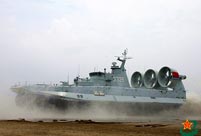 New hovercrafts debut in landing exercise
New hovercrafts debut in landing exercise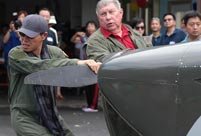 Home-made plane completes test flight in Chicago
Home-made plane completes test flight in Chicago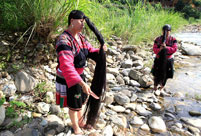 Huangluo: China's 'long hair village'
Huangluo: China's 'long hair village' Spectacular bridge with one of the tallest piers in the world
Spectacular bridge with one of the tallest piers in the world Magnificent view of Hukou Waterfall
Magnificent view of Hukou Waterfall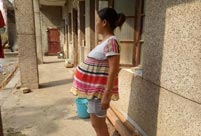 Woman sets Guinness World Record with 17-month-long pregnancy
Woman sets Guinness World Record with 17-month-long pregnancy A glimpse of Stride 2016 Zhurihe B military drill
A glimpse of Stride 2016 Zhurihe B military drill Top 10 livable Chinese cities
Top 10 livable Chinese cities Top 20 hottest women in the world in 2014
Top 20 hottest women in the world in 2014 Top 10 hardest languages to learn
Top 10 hardest languages to learn China’s Top 10 Unique Bridges, Highways and Roads
China’s Top 10 Unique Bridges, Highways and Roads Carter wrong to blame China for NK nuke issue
Carter wrong to blame China for NK nuke issue Beijing once again vows to renovate the shantytown in its CBD
Beijing once again vows to renovate the shantytown in its CBD New forensic technology helps cops nab serial killer 14 years after last murder
New forensic technology helps cops nab serial killer 14 years after last murder Cross-national marriages meet higher divorce rates due to cultural differences, parenting styles and lack of communication
Cross-national marriages meet higher divorce rates due to cultural differences, parenting styles and lack of communicationDay|Week